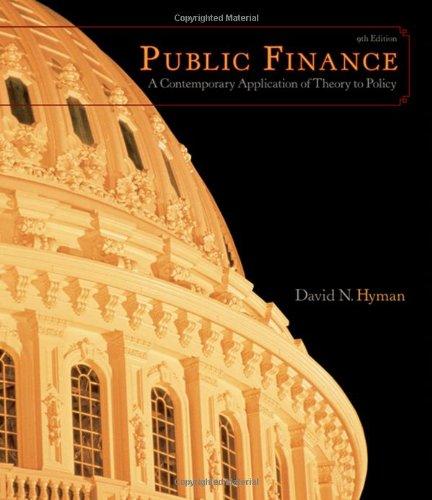Question
Healy Pharmaceuticals is considering an alternative waste treatment technology for one of its fermentation products. The technology, a zero-discharge closed-loop system, would purify the waste
Healy Pharmaceuticals is considering an alternative waste treatment technology for one of its fermentation products. The technology, a zero-discharge closed-loop system, would purify the waste water from the fermentation process and return it (in better shape than the available water from the standard source) to the production process. The process would produce sludge, useful as fertilizer due to the high concentration of nutrients, at the rate of 100 pound per month. Healy could sell the sludge to local farmers for an unknown price per pound.
The purchase price for the system, which has an expected life of five years with no salvage value, is $420,000. Preparing the facility and installing the system will cost $39,000 while training the operators on the new system will cost $27,000. Finally, shipping the equipment to the Healy facility will cost $14,000.
Various annual operating costs for the current and proposed systems are
Item Current Proposed
Water usage $55,000 $10,000
Chemical usage $15,000 $10,000
Sludge disposal $50,000 $0
Discharge sampling (treated water to environment) $45,000 $15,000
Pharmaceutical companies reported an average return on equity of 23% over the past five years. Healys average interest payments on its long-term debt are at a rate of 7% and its marginal tax rate is 30%. Its stock has a beta of 2.35 and current T-bill rates are 2% for oneyear notes and 6% for 10-year notes. The company will pay for the new treatment system with available cash. Healys debt-to-equity ratio is 0.67 (2/3). Note that this does not mean that the proportion of debt is 67%.
What is the minimum price per pound of sludge that Healy must be able to obtain for the project to have a positive net present value?
Lets continue with the Healy Pharmaceuticals sludge business from Problem 1. Other than drawing on specific details as necessary, ignore any information about timing from the earlier problem.
Assume it is January 1, Year 1. Healys Strategic Technology Analysis Team (STAT) has become aware of the very early work on the zero-discharge closed-loop waste treatment system. STAT believes that it will take 40 months of research and testing before the various regulatory agencies would approve installation of the new technology. Such installation would then require 17 months before changeover to the new system could be fully implemented.
On January 1, Year 1, Healys D/E ratio is 7 to 5. Healys average interest payments on its long-term debt are at a rate of 7% and its marginal tax rate is 35%. Healys common stock is 1.6 times as risky as the S&P 500. Current T-bill rates are 3% for one-year notes and 6% for 10-year notes. Because the volatility of returns to new environmental treatment technology is so high (95%), STAT believes the appropriate discount rate for this project is 20% (not 20 percentage points) higher than the companys WACC.
STAT estimates that sludge will sell for $75 per pound and that Healy will generate 2,000 pounds per year. Filtration material costs will likely be $25,000 per year, with other operating cost estimates unchanged. The necessary capitalizable expenditures if Healy implements the new technology will all be 30% greater than the original estimates, with potential salvage value of the hardware equal to $50,000. The useful life should be about eight years.
Assume as well that STAT believes implementing the new technology could bring green benefits to Healy from being able to promote its use of the new technology that have a present value of $604,000 as of January 1, Year 1.
Finally, on December 31, Year 0, Healy can pay $308,000 for exclusive rights to the new technology.
What is the maximum (constant) annual spending on technology development that Healy can invest over the next four years such that acquiring the exclusive rights is a positive total value investment?
Step by Step Solution
There are 3 Steps involved in it
Step: 1

Get Instant Access to Expert-Tailored Solutions
See step-by-step solutions with expert insights and AI powered tools for academic success
Step: 2

Step: 3

Ace Your Homework with AI
Get the answers you need in no time with our AI-driven, step-by-step assistance
Get Started


